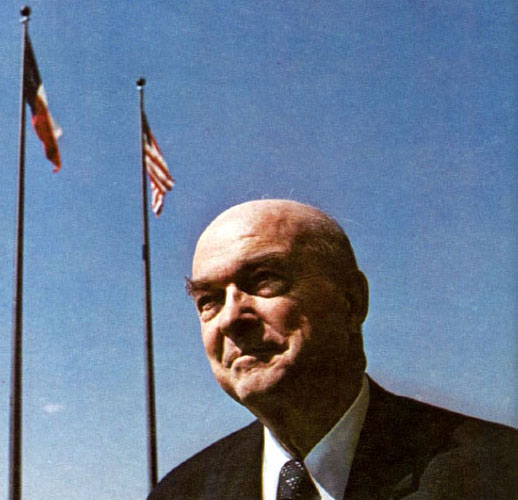Commemorating 50th anniversary
of Mayor J. Erik Jonsson’s “Goals for Dallas”
SMU's Maguire Center observes the 50th anniversary of Mayor J. Eric Jonsson's iconic "Goals for Dallas."

DALLAS (SMU) – Hundreds of Dallas’ leading public servants, including Mayor Mike Rawlings and DISD Superintendent Mike Miles, joined emerging leaders at SMU on Feb. 6 to commemorate the 50th anniversary of Mayor J. Erik Jonsson’s citizen-led “Goals for Dallas.”
 J. Erik Jonsson |
Jonsson, a founder of Texas Instruments, became mayor of Dallas in 1964, shortly after the assassination of President John F. Kennedy. Already a strong advocate for education, he worked to improve morale and the image of the city throughout his term.
Jonsson's “Goals for Dallas” initiative spurred the construction of DFW Airport, the Dallas Convention Center, the New Museum of Fine Arts and Dallas City Hall. The program helped establish public school kindergartens, citywide family planning, the University of Texas at Dallas, several branch libraries and neighborhood parks.
The sold-out event, “Goals for Dallas: The Impact of Ethical Leadership,” was sponsored by SMU’s Cary M. Maguire Center for Ethics & Public Responsibility and was held in the Martha Proctor Mack Grand Ballroom of SMU's Umphrey Lee Center.
“This 50-year anniversary accomplishes two goals. It celebrates the growth of Dallas envisioned by a mayor who saw it as his moral duty to bring people together to create a vision for the future. It also connects our city’s most accomplished leaders with the next generation,” says Maguire Ethics Center Director Rita Kirk.
Some 103 organizations represented the 12 focus areas/task forces within Mayor Jonsson’s original Goals for Dallas Plan: government, city design, health, welfare, transportation and communication, public safety, elementary and secondary education, higher education, continuing education, cultural activities, recreation and entertainment and the economy. Also in attendance will be students, faculty, and emerging leaders – purposely seated with city leaders to foster inclusiveness and progressive purpose.
Walter J. Humann, 2012 recipient of the J. Erik Jonsson Ethics Award and Maguire Ethics Center board member, was a young businessman who entered a life of public service after serving as the first White House Fellow from Texas in the late 1960s. He says the opportunity to serve both President Lyndon B. Johnson and the City of Dallas was due in large part to Mayor Jonsson, who would become his mentor. Humann, who leads WJH Corporation, is chiefly recognized for creating the Dallas Area Rapid Transit (DART) system and helping desegregate Dallas schools.
“Mayor Jonsson’s Goals for Dallas was an attempt to break the grip of siloed leadership on the city,” Humann says. “It aimed to attack the many problems we faced in an interconnected, holistic way, and help Dallas reach its fullest potential.”
The Cary M. Maguire Center for Ethics & Public Responsibility heightens ethical awareness throughout the campus and in the greater Dallas community. The center serves as a forum for the exploration of issues bearing on the public good. It brings together those who confront issues of social importance with resources and opportunity for ethical reflection. For more details, visit smu.edu/ethics.
SMU is a nationally ranked private university in Dallas founded 100 years ago. Today, SMU enrolls nearly 11,000 students who benefit from the academic opportunities and international reach of seven degree-granting schools.
Related Links:
- The Dallas Morning News: In tribute to ex-mayor Jonsson’s legendary Goals for Dallas, Rawlings says city’s southern tax base should surpass north
- The Dallas Morning News: Mayor Rawlings not shy in setting forth goals for Dallas
- The Dallas Observer: 50 Years Ago, the Mayor Formulated Dozens of "Goals for Dallas." So, How'd We Do?
# # #
20066-nr-02/03/14-dg